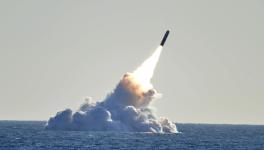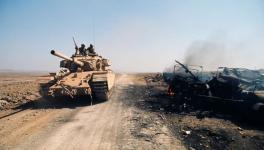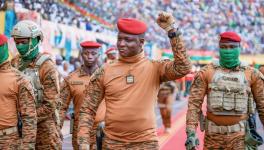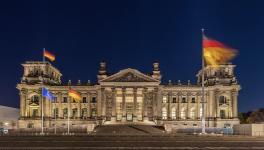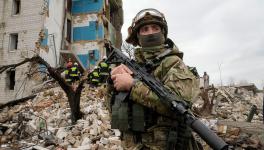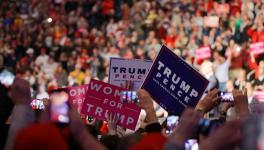Russia-Ukraine War: Big Sport’s Hard Hypocrisy as the World Uses its Soft Power
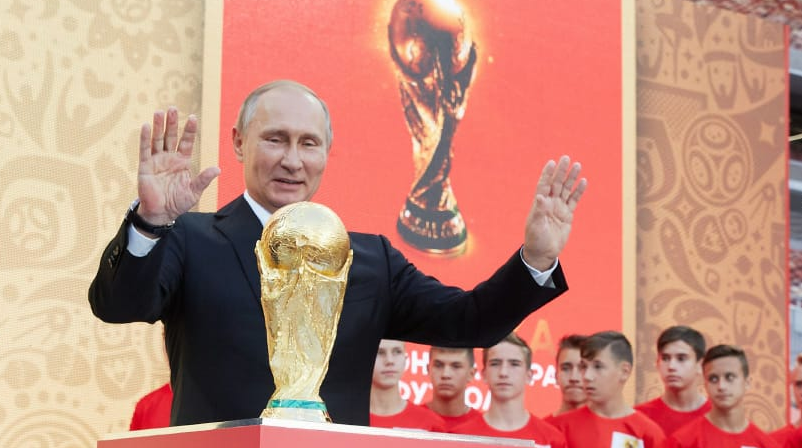
Russian President Vladimir Putin has always understood sport’s power in geopolitics. It has been central to his image and strategy.
To fully fathom history we need not look beyond the historian who wrote it down for reference in posterity, a lesson for future generations. Narratives, of course, will be skewed, subjective, and reeking of a majoritarian will — that of the victor under whom the chronicler survives. History, in present tense, panning out in real time, however, is like beauty. Both beauty and landmarks on the human timeline are subjective, open to interpretation, or like the cliche goes, lie in the eyes of the beholder.
So what do we behold now with Russia attacking Ukraine, and a nasty war with direct or indirect global implications looming large over the horizon? Well, there is no beauty in war.
Russia breaching the Ukrainian border and launching a full scale attack is by no means justifiable. Then again, any country invading any other country is bad. War, violence, death, destruction and suffering; well, nothing justifies it. What is also unjustified is bias in the way you understand it, sanction it or report it.
When big sport wields its soft power to make a point against Vladimir Putin, reminding him of the possible larger repercussions in his own country, we stand up and take note. We applaud at the nobility of it all. But it is worthwhile to consider the hypocrisy.
Also Read | Cryptocurrency and Football's Perfect Match Causes Concerns
We don’t need much effort to jog the memory to instances in history where this power of sport was used, or abused, as propaganda. It is so normalised, naturalised even, that we fail to notice it being pushed. More importantly, we fail to question the finer detail in a narrative. The Berlin Olympics and the Jesse Owens vs Adolf Hitler narrative, for instance. We understand what was at stake for Germany in 1936. There was more to Owens’ story too, than what we learnt in our textbooks. But the struggle of the black man back in his free and fair country was never the point to be addressed in the feel good story. Was it? The war was in Europe too. Deja vu!
The message sent out is loud and the threat is pretty clear. This power sport wields isn’t soft. Putin and Russia have used sport for international legitimacy, much like many countries in the past. The diplomatic boycott of the Beijing Winter Olympics by the USA, Australia and even India reiterates a nation’s understanding of soft power in sport and how unabashed they are when using it.
The Russian President has always understood sport’s power in geopolitics. It has been central to his image and strategy. It goes beyond the Judo gi he is seen in every now and then as part of a sporty and hypermasculine persona. He has also tried to push Russia into the forefront of global sport. We are talking about not just the medals tally here. Russian stakes in the business of sport cuts across borders while its cities have proven themselves as destinations for mega events.
Of course, the victories in the arena matter too, even though there are accusations that the means used by Russia are questionable with the spectre of state-sponsored doping hanging over its athletes at every major global sporting event. The political messaging through the medals tally — or sport in general — has been in vogue for a while now. The overt race perhaps reached its height during the Cold War. Its impact has been magnified by the information revolution and the explosion of discourse that predominantly plays out on social media and other open platforms. These platforms with their ability to sway narratives matter more than reportage today. And sport is at home in that dark well.
From its modern nationalistic role — to showcase a country’s success, its ideology and economic superiority — in the 20th century, sport has grown itself into an entity larger than nations, carrying cultural, business and social implications while the political ramifications remain ever so present as a background score. An eerie reminder even.
The Russia-Ukraine crisis has seen Premier League club Chelsea FC owner Roman Abrahamovic trying to distance himself (at least on media) from Moscow to shore up his business interest in football. Manchester United refused to fly onboard their official carrier, Russian airline Aeroflot. The Haas F1 team has removed the Russian flag livery and its owner’s (and chief sponsor) branding from its new car. These are symbolic ‘sanctions’ alongside the economic sanctions that are already in place in the realm of hard politics. More are expected . Sport’s soft power is centred around money as much as it is about political posturing. More than we would like to believe, and in a language politicians understand. Putin surely is listening.
Also Read | Surajit Sengupta Tribute: The Crowd-pulling Winger From Indian Football’s Dark Age
Meanwhile, the global sporting mechanism, usually slow and measured in its own reactions, has come in thick and fast. From the shifting of the UEFA Champions League final, the Chess Olympiad and the Formula One Grand Prix from Russia, to countries pulling out of their FIFA World Cup qualifier ties with Russia, the attack on Ukraine is now a global sports issue with personal ramifications on Putin as well. The International Judo Federation removed the Russian President as its honorary president and ambassador.
FIFA initially mulled taking the tried and tested International Olympic Committee (IOC) route of allowing Russia to play but not under their own flag — they would instead be called the Russian Football Union. Following the initial decisions taken by the FIFA Council and the UEFA Executive Committee, which recommended additional measures, FIFA and the UEFA decided to suspend all Russian teams, national as well as club sides, from participating in both FIFA and UEFA competitions until further notice.
All of this is good. And yet it all begs a question. Do some lives matter more than others? Is the value of life different in different hemispheres?
At this point in history, the Eastern provinces of Ukraine, and Kyiv, are not the only conflict zones in the world where lives are lost, rockets fired, and civilians killed and rendered homeless. Sport, however, chose to act now. It stood by when Saudi Arabia chose to bomb Yemen or when the US bombed Somalia — both have happened in the days the Russia-Ukraine conflict escalated. It refused to intervene when the USA and the UK forces invaded Iraq. Or when Syria was bombarded indiscriminately. It has stood by as Israel dropped bombs on homeless Palestinians and effectively ghettoed them into convenient corners. Let us also not forget Afghanistan. That’s recent history. Oh wait, it is so conveniently buried under the information rubble which hardly gives time for the truth to sink in and prick our conscience, enlighten our consciousness. The bane of a heavily digitised existence that seeks instant gratification before moving on, perhaps. This amnesic flow of information is sickening and dangerous.
Global efforts such as these never materialised during the direct and indirect interventions the United States have made in various continents under various guises, giving many more justifications. Civilian life can be termed collateral damage. It’s about timing, after all. Just got to know how to do it, and when and where. Then again, the larger right or wrong is not the question here. The Internet runs in binary, but life is more than dots and dashes and one right and one wrong. Russia is wrong. So is the USA or Israel. They are all culpable. Power politics is the name of the game here.
Also Read | IPL Auction: Where Talent Meets Opportunism, and Privilege Holds Court
No one asked questions of the American owners of English football clubs when their country engaged in multiple escalations across the world. No one asked that Manchester City be managed by a ‘charitable trust’ when its owners were effectively accused of killing journalist Jamal Khashoggi on foreign soil. Nor were there any sanctions on international events staged in these countries. This narrative is played out constantly on one side of the global political and economic divide.
The global outrage against Russia is important. This is by no means an attempt to call it futile. The push, in fact, could lead to a quick resolution of the crisis. Sport cuts across culture, economic, political, racial and regional barriers. That is exactly why when a Russian tennis player — Andrey Rublev — wrote on a television camera, “No War, Please,” after a match, that message went viral and was accepted as the larger representation of the will of ordinary citizens of Russia. Kyiv mayor and former pro boxer Vitali Klitschko’s messages have had a similar reach in pushing the “voice” of Ukraine.
There is no need to further validate the power of sport, soft or not. The selectiveness hardly makes the move sporting. This is not a level playing field — a basic tenet of all sports. This is sport under a larger imperialist agenda. It has always been so.
Along with the various moves made across the world — the latest being economic repercussions including European Union’s ban of operations related to management of Central Bank of Russia's assets — the impact on sport in Russia and Russia on sport may well play a role in taking things toward a diplomatic solution, tenable and acceptable to all parties.
If that happens, then the biggest question mark will be on the intent of all the stakeholders who pushed. When reading the history books we will wonder whether a timely and honourable exercising of soft power from various sectors would have led to lesser conflicts, death and destruction across the world. That answer we may never get. For we are all caught up in the narrative being played out for consumption and active social participation. Over the internet, in binary code.
Europe is burning. A war on that continent is, apparently, worse than all others. It is after all not the ‘third’ world where killings, day in day out, are normalised and dehumanised by the larger world. Quite consciously that too. Maybe the citadels of European cities burn differently to the domes of Damascus or the homes of Gaza. Maybe the value of lives lost in Africa or Asia is a tad lesser than what is being lost in Ukraine. The inequality, or inequitable nature of life has once again been spotlighted.
Sport apparently does not discriminate. But those that play do. Did someone say we are all one and the same? We are humans! Are we?
Get the latest reports & analysis with people's perspective on Protests, movements & deep analytical videos, discussions of the current affairs in your Telegram app. Subscribe to NewsClick's Telegram channel & get Real-Time updates on stories, as they get published on our website.











